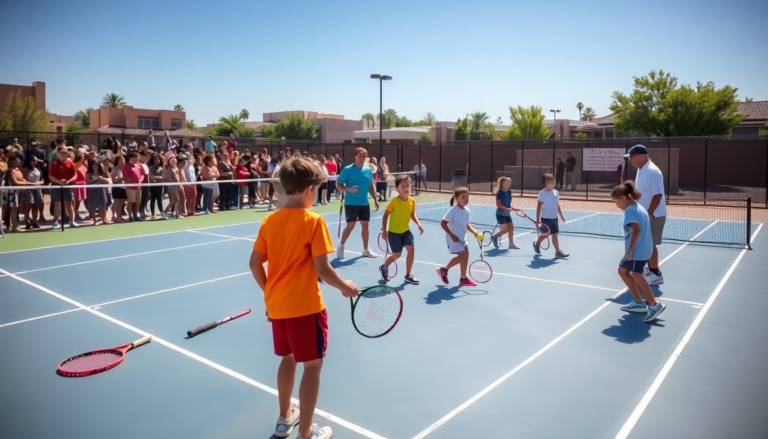Argomenti trattati
Introducing Ethan Lee and ACEing Autism
In Tempe, Arizona, the Intercollegiate Tennis Association (ITA) is celebrating the power of sport to foster inclusion with a spotlight on student-athlete Ethan Lee. Collaborating with the ITA Student-Athlete Council, this initiative aims to showcase diverse backgrounds and experiences that enrich the world of college tennis. This month, as we observe Autism Acceptance Month, we focus on how student-athletes like Lee are making significant strides in creating accepting communities on their campuses.
Ethan Lee, a standout at Pomona Pitzer, has been pivotal in leading the ACEing Autism program for the past three years. Initially joining as a participant, he soon took on the role of program director, where he balances his responsibilities on the tennis court with his dedication to this impactful initiative. Under his leadership, Pomona Pitzer is currently ranked No. 20 in the ITA Division III Team Rankings, and Lee himself holds the No. 32 position in the ITA Singles Rankings.
A passion for inclusion and community building
Lee’s journey with ACEing Autism began with a simple inspiration from his friends and teammates, Rohun Krishnan and Matthew Feng. He expressed that the joy of competing on the tennis court transcends the game itself, providing opportunities for learning, friendship, and community. Through ACEing Autism, he has found a platform to share his love of tennis with individuals who are often overlooked, particularly those within the autism community.
“It has become one of my greatest passions,” Lee shares. “Every week, I look forward to the energy and excitement that our sessions bring. We aim to create a safe space for children to express themselves through tennis, helping them grow both physically and socially.”
Lessons learned and leadership development
Being an ACEing Autism program director has significantly influenced Lee’s approach to coaching and leadership. It has reignited his passion for tennis, allowing him to experience the game from a fresh perspective. “The creativity and enthusiasm brought by the kids and volunteers inspire us all,” he explains. “Each session is a new adventure, full of challenges and surprises.”
Lee emphasizes that the program is not just about teaching tennis; it’s about building relationships and fostering community. The volunteers from Pomona Pitzer’s Men’s and Women’s Tennis Teams, as well as other varsity athletes, come together to create an environment where everyone can thrive.
Changing the culture of tennis through acceptance
Lee believes that ACEing Autism has transformed the culture of tennis at Pomona Pitzer. The program has promoted inclusivity and acceptance, allowing athletes with autism to feel welcome and valued. “Our interactions with these athletes have fostered lasting relationships and a sense of community,” he remarks. “Many of the kids now come equipped with their own racquets, ready to play!”
He advocates for increased awareness around autism, highlighting that many people are unaware of the substantial population living with it. “Autism is not a disease; it’s a different way of life,” Lee asserts. He suggests potential collaborations with known figures like Jensen Brooksby, a professional tennis player with autism, to further promote awareness.
Advice for aspiring program leaders
For those looking to create their own ACEing Autism programs, Lee’s advice is clear: “If you have the means, dive in! It has been incredibly rewarding for me, and it has transformed my outlook on tennis and community service.” He expresses how these experiences have invigorated him, helping him grow as both an athlete and a person.
Lee reflects on the profound impact of building relationships with the children involved in the program. He cherishes every small success they achieve, from learning the basics of tennis to rallying and playing matches. “Witnessing their growth has been the most fulfilling part of this journey,” he says.
Personal growth through service
Through his involvement with ACEing Autism, Lee has gained a deeper understanding of autism and what it means to create inclusive environments. As he prepares for medical school after graduation, he acknowledges how this experience has reshaped his perspective on medicine. “It’s not just about physical healing; it’s about enriching lives and fostering emotional well-being,” he concludes. “This journey has taught me the true essence of serving others with dignity and humanity.”

